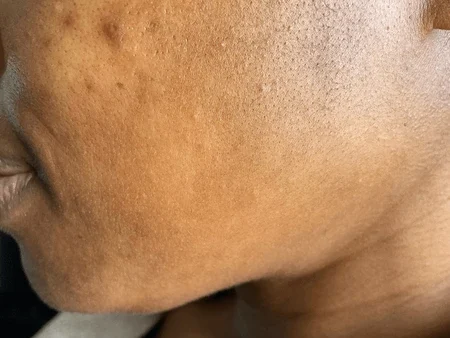Introduction: Why Blackheads and Acne Are Linked
Blackheads and acne are two of the most common skin concerns people face. The connection between them lies in how our pores react to oil, bacteria and dead skin cells. While blackheads are a type of acne lesion, they often appear alongside pimples on the face, especially in oily or acne-prone skin. Understanding how they form can help you treat them effectively and prevent future breakouts.

In this article, we’ll break down how blackheads and acne are related, why hormonal pimples appear and the role of using the right soap and skincare products for clear, healthy skin.
What Are Blackheads?
Blackheads are a form of non-inflammatory acne. They occur when a hair follicle becomes clogged with excess sebum (oil) and dead skin cells. Unlike whiteheads, blackheads remain open at the surface, which is why they appear dark or black.
They usually show up on areas with more oil glands, like the nose, chin and forehead. While not painful, blackheads can be persistent and often lead to the development of pimples if bacteria get trapped inside.
What Causes Acne and Pimples on the Face?
Acne is a broader skin condition that includes blackheads, whiteheads, papules, pustules and cysts. Pimples on the face usually occur when clogged pores become inflamed due to bacterial activity.
Some of the main causes of acne include:
- Excess oil production – Sebaceous glands overproduce sebum.
- Clogged pores – Dead skin cells block pores, leading to blackheads.
- Bacteria (Cutibacterium acnes) – Increases inflammation, causing pimples.
- Hormonal changes – Hormonal pimples are especially common during puberty, menstruation, or stress.
- Lifestyle and diet – Processed foods, stress, and lack of skincare routines can worsen acne.
For a deeper look at acne causes and prevention, you can check out trusted resources such as American Academy of Dermatology.
The Connection Between Blackheads and Acne
So, what’s the link between blackheads and acne? In simple terms:
- Blackheads are the starting point of many acne breakouts.
- When blackheads remain unclogged but uninfected, they stay non-inflammatory.
- When bacteria and inflammation join the mix, blackheads can turn into red, painful pimples.
This means that addressing blackheads early can significantly reduce the risk of developing more severe acne.
Hormonal Pimples: Why They Happen
Hormonal pimples are another common issue tied to blackheads and acne. Hormones—particularly androgens—stimulate sebaceous glands to produce more oil. This excess oil leads to clogged pores, blackheads and eventually inflamed pimples.
Hormonal pimples usually:
- Appear around the jawline and chin.
- Flare up during menstrual cycles or stressful times.
- Are harder to treat with just topical remedies.
Managing hormonal acne often requires a combination of lifestyle changes, natural remedies and sometimes medical treatment.
How Soap and Skincare Affect Acne
One overlooked factor in acne care is the soap you use. Many commercial soaps contain harsh chemicals that strip the skin of natural oils, causing irritation and even more breakouts.
Switching to natural soaps made with ingredients like tea tree oil, moringa or neem can help reduce pimples on the face. These ingredients have antibacterial and anti-inflammatory properties, making them gentler yet effective on acne-prone skin.
You can explore natural skincare options at Gibeon Soaper for chemical-free soaps that support healthy, clear skin.
Natural Ways to Reduce Blackheads and Pimples
Here are some practical steps you can take to manage blackheads and acne naturally:
- Gentle cleansing – Wash your face twice daily with a mild, natural soap.
- Exfoliation – Use gentle exfoliants to prevent dead skin buildup.
- Oil control – Clay masks and natural remedies can help absorb excess oil.
- Healthy diet – Reduce sugary, oily foods that worsen acne.
- Stress management – Stress can increase hormonal pimples, so practice relaxation.
- Consistent routine – Avoid switching products too often; consistency matters.
When to See a Dermatologist
While mild blackheads and pimples can be managed with a good skincare routine, persistent or severe acne may need medical attention. Dermatologists can prescribe topical retinoids, antibiotics or hormonal treatments depending on the severity of your condition.
Conclusion: Take Control of Blackheads and Acne
Blackheads and acne are connected through clogged pores, excess oil and bacterial activity. Treating blackheads early can reduce the risk of pimples, while understanding hormonal factors helps prevent recurring flare-ups.
With the right soap, a gentle skincare routine and awareness of your skin’s triggers, you can control blackheads, reduce pimples on your face, and support long-term skin health naturally.
